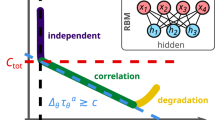Abstract
Earlier, Guesgen and Hertzberg have given a theoretical description of how to implement constraint relaxation in terms of combinatorial optimization using the concept of Boltzmann Machines. This paper sketches some lessons that an implementation of this idea has taught us about how to tailor the translation from constraint networks to Boltzmann Machines such that the resulting implementation be efficient.
Preview
Unable to display preview. Download preview PDF.
Similar content being viewed by others
References
E. Aarts and J. Korst. Simulated Annealing and Boltzmann Machines. John Wiley & Sons, Cichester, England, 1989.
T.L. Dean and M. Boddy. An analysis of time-dependent planning. In Proc. AAAI-88, pages 49–54, St. Paul, Minnesota, 1988.
Y. Descotte and J.C. Latombe. Making compromises among antagonist constraints in a planner. Artificial Intelligence, 27:183–217, 1985.
D. Dubois, H. Fargier, and H. Prade. Propagation and satisfaction of flexible constraints. Rapport IRIT/92-59-R, IRIT, Toulouse Cedex, France, 1992.
B.N. Freeman-Benson, J. Maloney, and A. Borning. An incremental constraint solver. Communications of the ACM, 33:54–63, 1990.
E.C. Freuder. Partial constraint satisfaction. In Proc. IJCAI-89, pages 278–283, Detroit, Michigan, 1989.
H.W. Guesgen. A formal framework for weak constraint satisfaction based on fuzzy sets. In Proc. ANZIIS-94, pages 199–203, Brisbane, Australia, 1994.
H.W. Guesgen and J. Hertzberg. A Perspective of Constraint-Based Reasoning. Lecture Notes in Artificial Intelligence 597. Springer, Berlin, Germany, 1992.
H.W. Guesgen and J. Hertzberg. A constraint-based approach to spatiotemporal reasoning. Applied Intelligence (Special Issue on Applications of Temporal Models), 3:71–90, 1993.
J. Hertzberg, H.W. Guesgen, A. Voß, M. Fidelak, and H. Voß. Relaxing constraint networks to resolve inconsistencies. In Proc. GWAI-88, pages 61–65, Eringerfeld, Germany, 1988.
A. Philpott. Fuzzy constraint satisfaction. Master's thesis, University of Auckland, Auckland, New Zealand, 1995.
J. Prust and W. Vonolfen. Dokumentation PARABOL 1.0. Unpublished documentation document, GMD, 1993.
Z. Ruttkay. Fuzzy constraint satisfaction. In Proc. FUZZ-IEEE'94, Orlando, Florida, 1994.
R. Weißschnur. Die Projektion von Constraint-Satisfaction-Problemen auf Boltzmann-Maschinen. Master's thesis, Universität Bonn, Institut für Informatik, May 1994.
Author information
Authors and Affiliations
Editor information
Rights and permissions
Copyright information
© 1996 Springer-Verlag Berlin Heidelberg
About this paper
Cite this paper
Weißschnur, R., Hertzberg, J., Guesgen, H.W. (1996). Experiences in solving constraint relaxation networks with Boltzmann Machines. In: Jampel, M., Freuder, E., Maher, M. (eds) Over-Constrained Systems. OCS 1995. Lecture Notes in Computer Science, vol 1106. Springer, Berlin, Heidelberg. https://doi.org/10.1007/3-540-61479-6_29
Download citation
DOI: https://doi.org/10.1007/3-540-61479-6_29
Published:
Publisher Name: Springer, Berlin, Heidelberg
Print ISBN: 978-3-540-61479-1
Online ISBN: 978-3-540-68601-9
eBook Packages: Springer Book Archive




